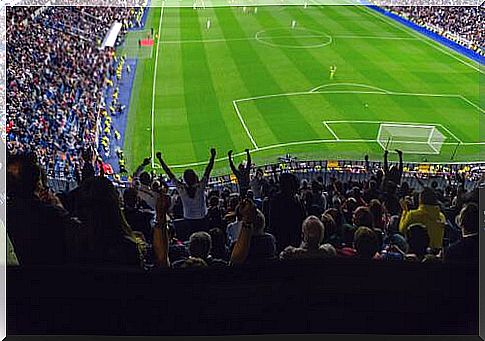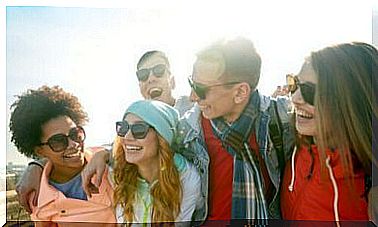How Does The Presence Of Others Influence Our Behavior?

Do you think we act the same way when someone is watching us? Do you think that someone who judges or criticizes has the same effect on us as a simple observer? Do you think that the presence of others can improve or hinder our performance in the development of a task? Keep reading to find out.
One of the first authors who became interested in these questions and wanted to do this kind of experiments was Norman Triplett, who was able to see that the presence of others improved our performance. He carried out his experiments with cyclists and compared their marks in their training alone and later in training with other cyclists.
Another experiment developed by this same author was carried out with children, and he was also able to see how the performance varied depending on whether they were accompanied by other children or not. Working times decreased and everyone did it faster and better when they performed the tasks accompanied than when they were alone in the observation situation.
These studies have shown that when working with other coauthors, that is, people who perform the same task as others, performance improves. But what happens when those watching are mere spectators?

social facilitation and social inhibition
Social facilitation refers to when the presence of others helps us to improve and perform the activity better. When does this happen? This effect appears when the task is easy for the person performing it or when it is a matter of knowledge that the person has mastered and that does not require much concentration and can be solved without complications.
On the other hand, in social inhibition the opposite happens. When a person is not familiar with the task or when it requires a lot of concentration and involvement from the subject, the presence of others will negatively influence performance, that is, social inhibition will occur.
These two effects can be understood when we focus on the type of task. When they judge our work or are mere spectators, experience and familiarity with the type of activity in question are decisive. So, I can benefit from someone looking to do the best I can or I would prefer to be alone to focus and develop my work better. It all depends on how the task is.
Does the number of people watching the work influence it?
In other studies carried out in the field of sports, the effect produced by the presence of others was studied, and they found social facilitation effects when the observers were ten or fewer people. When they studied the performance with many spectators (more than eleven), neither facilitating nor inhibiting effects were observed.

It may be that this is related to the conduct of the observers. When their behavior is positive and we have a certain amount of control over them, that is, we listen to their comments or we can analyze their gestures, they have an effect that influences us when we act. On the other hand, when it’s a large audience, we lose control over them and therefore we’re not sensitive to their influence.
Conclusions on how the presence of others influences us
The conclusions we derive from the presence of others are related to the type of task we have to perform. When the task is easy, we can improve our performance when someone watches us ; on the other hand, the throughput decreases in relation to the performance we would achieve alone when the task is complicated and requires all your attention.
It may be that overactivation caused by the presence of other people is positive when we can perform the task without having to use all our cognitive resources. On the other hand, when the task requires us to put all our attention into it, the others can cause a rush that doesn’t benefit us (since there’s probably already a good level of acceleration due to the complexity of the challenge) and ends up distracting us.








